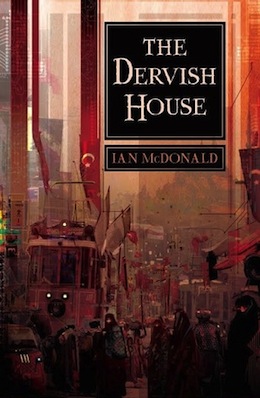My friend (and Tor.com novella writer) Rob Ziegler has a saying about a word, sentence, or section of a book which really blows him away: “That was so good, I want to punch the author in the face.” Rob (one of the nicer guys in the business) obviously only means that metaphorically, but I can sympathize with the sentiment…sometimes you run into something so good that as an author you can’t help wishing you had come up with it yourself.
Such was the case with my first reading of Ian McDonald’s The Dervish House, several years ago. Friend and fellow speculative fiction writer (also a Tor.com novella writer) Brad Beaulieu and I had tapped Ian to appear on our podcast Speculate as part of our set of shows on The Dervish House, and when I sat down to read it I expected to react as I usually do to good work: intrigued by the premise, impressed with the craft, and excited to read more. Then I read the opening sentence: “The white bird climbs above the city of Istanbul: a stork, riding the rising air in a spiral of black-tipped wings. A flare of the feathers; it wheels on the exhalation of twenty million people…”
Well, I thought. Guess I’m all in now.
The opening chapter of The Dervish House, a book about Istanbul, begins with a stork. In fact, the first two paragraphs are about storks. And based on much current advice about genre writing—get the reader into the story as fast as possible, don’t wander about the main idea, drop them right into the heart of the action—it ought to be an utter failure. Yet the shifting of expectations is so surprising, and the craft so brilliant, once you’re well into the book it’s hard to imagine it beginning any other way. This is very much a story about place, after all, and—like all of McDonald’s books—it is driven by the seemingly endless and intimate knowledge of that place. “Istanbul, Queen of Cities” is as much a character in The Dervish House as Necdet, Can, or any other of the fascinating people which populate the book’s pages, and clearly McDonald wants the reader to get to know it as much as possible. But rather than dropping us into one of its busy marketplaces or streets, overwhelming our senses and critical capacities, he brings us in slowly, gradually, spiraling above the city with the storks making their twice-yearly migration.
As the narrative continues, McDonald begins to bring in more details about Istanbul and its current conditions—sweltering heat, the sound of countless air conditioners and fans, the noise of radio talk shows as the city prepares for a big Champions’ League match—and then the explosion which truly begins the tale. But by the time we get there, we have already been irresistibly seduced by the city itself, and we cannot wait to hear more of its story. It’s brilliant in part because it is so counter to what we typically expect, immediate tension and conflict from the opening sentence. Instead it’s calm, peaceful, and utterly compelling; we can’t help leaning forward, with the stork, circling towards the gorgeously told story which awaits us.
I’ve had many people ask me, whether at a convention panel or in one of my classes, what books have most surprised me or blown me away, and of course my answer throughout the years has varied depending on the criteria and the time period. When I was younger, The Lord of the Rings amazed and inspired me; when I was in college, Snow Crash was one of the most stunning books I had ever read; when I was beginning my own writing career, John Gardner’s Grendel was an unequalled tour de force. But in the last ten years, I don’t know that any book has more gripped me earlier or more decisively than The Dervish House, and I know I’ve never read an opening page as striking as that one at any time. I certainly don’t want to punch McDonald in the face for having written something that good—but man. Work that surprising and assured? I’ll cop to being—just a little bit—jealous.
 Gregory A. Wilson is Professor of English at St. John’s University in New York City, where he teaches creative writing and fantasy fiction along with various other courses in literature. His first academic book was published by Clemson University Press in 2007; on the creative side, he has won an award for a national playwriting contest, and his first novel, a work of fantasy entitled The Third Sign, was published by Gale Cengage in the summer of 2009. His second novel, Icarus, will be published as a graphic novel by Silence in the Library Publishing in 2016, and he has just signed a three book deal with The Ed Greenwood Group, which will be publishing his Gray Assassin Trilogy beginning with his third novel, Grayshade, in 2016.
Gregory A. Wilson is Professor of English at St. John’s University in New York City, where he teaches creative writing and fantasy fiction along with various other courses in literature. His first academic book was published by Clemson University Press in 2007; on the creative side, he has won an award for a national playwriting contest, and his first novel, a work of fantasy entitled The Third Sign, was published by Gale Cengage in the summer of 2009. His second novel, Icarus, will be published as a graphic novel by Silence in the Library Publishing in 2016, and he has just signed a three book deal with The Ed Greenwood Group, which will be publishing his Gray Assassin Trilogy beginning with his third novel, Grayshade, in 2016.










